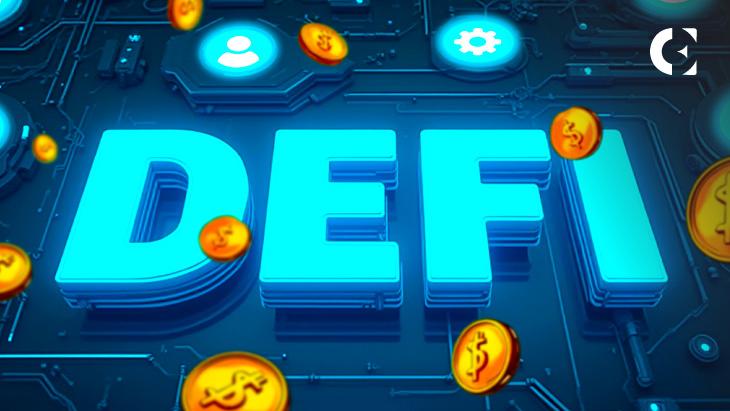Decentralized Finance, or DeFi, is changing how people access financial services. Built on the blockchain network, it allows users to lend, borrow, trade, and even save without any intermediaries like middlemen or banks. In this article, gain deep insights into its functionalities, features, legal concerns, benefits and risks, and much more.
Decentralized Finance, or DeFi, is changing how people access financial services. Built on the blockchain network, it allows users to lend, borrow, trade, and even save without any intermediaries like middlemen or banks. In this article, gain deep insights into its functionalities, features, legal concerns, benefits and risks, and much more.
The idea of DeFi was to establish a financial system that was accessible, open, and transparent, so that people did not need banks or middlemen. Although DeFi began with smart contracts in 2015, it gained traction after 2017 when developers thought up new ways in which DeFi could be applied. Further, in 2020, platforms like Compound, , and Aave introduced yield farming and liquidity mining. This enabled users to earn high returns, thus rapidly attracting billions in total value locked (TVL).
Without the necessity for permissions or paperwork, transactions became easier with just a crypto wallet and the Internet. Further, it enabled developers to build new tools and financial services in a more open system. Although DeFi still has issues, like bugs in the code or unclear government rules, it continues to grow, attracting not just individuals but also major corporations.
DeFi platforms are built on blockchain technology, which acts as a digital ledger that records all transactions securely and transparently. This ensures that every action is traceable, tamper-proof, and publicly accessible, increasing trust and eliminating the need for intermediaries.
It handles financial transactions effortlessly, thus removing the need for middlemen. It enables secure, accurate, and fast processes like lending, borrowing, and trading based on pre-defined rules and agreements.
DeFi protocols run through decentralized applications, or dApps, which offer users financial tools such as lending platforms, decentralized exchanges (DEXs), yield farming interfaces, and more. These apps are open-source and operate without centralized control, providing greater user freedom and transparency.
Users deposit tokens into smart contract-based pools to provide liquidity for trading or lending. In return, they earn interest or a share of transaction fees.
They ensure smart contracts can react to external conditions accurately, enabling use cases like synthetic assets and dynamic lending terms.
All transactions in are publicly recorded on the blockchain, ensuring fairness and trustworthiness. This transparency allows users to verify transactions and audit smart contracts, fostering trust and confidence in the system.
Unlike traditional finance, DeFi gives users complete control over their digital assets. Funds are stored in wallets secured by private keys, meaning no bank or centralized institution can access, freeze, or manage the user’s money without their permission or involvement.
This enables them to interact with each other and share information seamlessly. This interoperability creates a more cohesive financial ecosystem, allowing users to move assets and data between different DeFi platforms with ease.
By eliminating intermediaries, DeFi reduces transaction costs and fees, making financial services more affordable and accessible. Further, this allows users direct interaction with financial applications, thus reducing their dependency on centralized entities.
DeFi platforms are generally accessible to anyone with an internet connection and a compatible digital wallet. This eliminates the need for complex identity verification processes, making financial services more accessible to individuals who might be excluded from traditional systems.
When we talk about CeFi, financial activities like banking, transfers, and trades are guided by institutions like banks, payment providers, and brokers. They safeguard your funds and allow transfers, loans, and currency exchanges, which they often charge fees for. To transfer money, keep records, and ensure protection, you depend on financial institutions. People must often provide identity documents, and the services can be restricted by regional or legal rules. CeFi includes regulation and familiar services, but this also gives third parties full access to users’ money and personal data.
Instead of using banks, DeFi relies on blockchain and peer-to-peer (P2P) networks. Forgo bank transactions by utilizing decentralized applications (dApps) with . Using the code, programs are programmed to process lending, borrowing, or other transactions on their own. All actions are stored openly on a blockchain and can be checked from anywhere with an Internet connection. Customers can send, receive, and store their funds independently in digital wallets. DeFi gives people financial autonomy and access everywhere, though it also involves security, regulation, and user accountability risks.
With the development of decentralized finance, regulatory issues have also arisen. Since DeFi does not involve third parties, it is challenging to apply the laws. Further, issues around compliance, user protection, and accountability remain unresolved, especially across global jurisdictions. Moreover, regulators are unsure of the classification of DeFi activities, which creates more legal concerns. Here are some of the key legal issues:
plays the role of the financial infrastructure of the decentralized financial economy that offers the underlying infrastructure that moves money around, lends, and trades without the use of centralized financial institutions. It allows people and companies to join a decentralized permissionless market and enjoy the freedom of value mobility and safety. Through smart contracts, DeFi allows the cutting of ties between the participants, lowering the barriers to entry, and minimizing the reliance on classic intermediaries. This creates innovation, transparency and financial inclusion, which are the main tenets of the decentralised economy. Finally, DeFi contributes to the creation of a strong and self-controlled economic system that does not need centralized parties or censorship.
